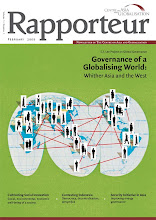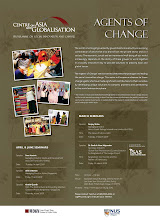 CAG has recently launched a multidisciplinary global governance project which will look at how state, the private sector and civil society can better organize strategies to address the deficiencies in global governance. One focus is on global health governance which over the past several years has risen rapidly on the global agenda. Thanks to the Gates Foundation and new resources from various donors, substantial funds have become available, particularly for HIV/ AIDS. However, have the funds been used effectively?
CAG has recently launched a multidisciplinary global governance project which will look at how state, the private sector and civil society can better organize strategies to address the deficiencies in global governance. One focus is on global health governance which over the past several years has risen rapidly on the global agenda. Thanks to the Gates Foundation and new resources from various donors, substantial funds have become available, particularly for HIV/ AIDS. However, have the funds been used effectively?
Laurie Garrett, a Senior Fellow for Global Health at the Council on Foreign Relations and one of the most respected intellects on global health, points out in an article published in the International Herald Tribune that the fight against AIDS today has been all about “treatment”, rather than finding a long-term cure. She laments: “the slogan of the first 15 years of the pandemic was 'until there is a cure!'. Today it seems the global health leadership of the world is satisfied with, ‘until there is lifelong drug therapy for everybody, and no prevention strategy!'." Laurie warns that “a dangerous sentiment is sweeping over the AIDS establishment, calling for elimination of all funding for HIV vaccine research and prevention programs, shifting those dollars. euros and yen to expanding HIV treatment”. Read Laurie Garrett's article "The wrong way to fight AIDS"
To make things worse, the standard HIV drug treatment given to new patients in poorer countries in Africa is developing alarming levels of resistance ("When the drugs don't work", FT, 1 August, 2008). This warrants a serious concern given the escalating economic burden of HIV treatments and the lack of options in using alternatives. Compounding this problem is that there is only little data available on resistance. The article points out that many donors and HIV drug treatment companies have spent a lot of efforts and funds in accelerating drug-based treatment but not much in monitoring the resistance. Most of them lack the capacity to carry out appropriate resistance studies, the article finds. Clearly, there is an urgent need to build in appropriate governance mechanisms for long-term capacity building in monitoring resistance. Read "When the drugs don't work". [Sung]










No comments:
Post a Comment